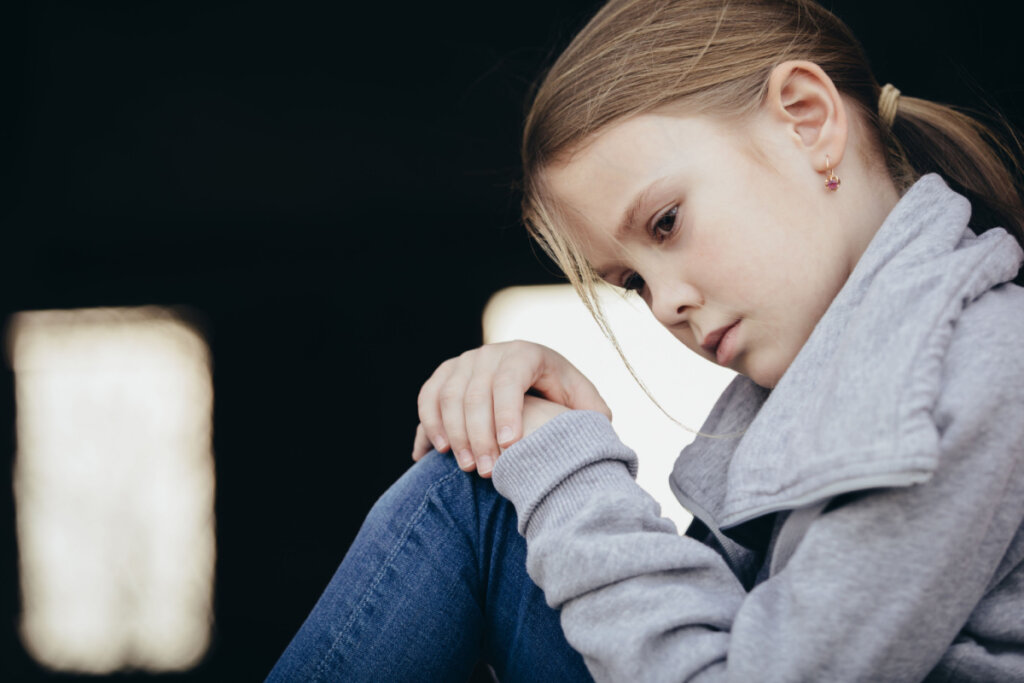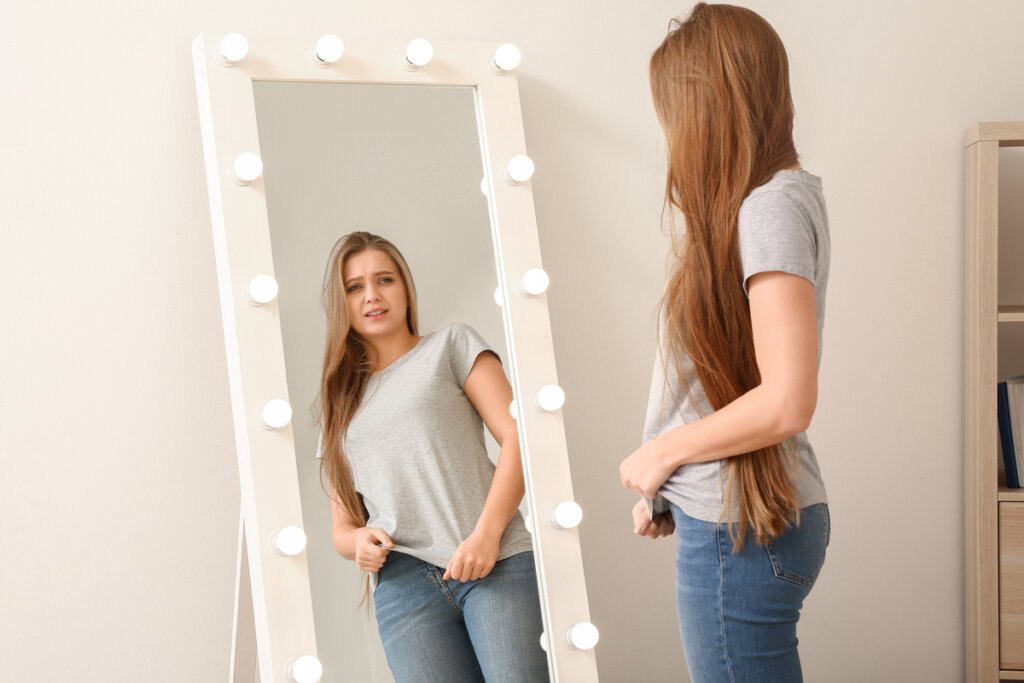We're Not Born Hating Our Bodies


Written and verified by the psychologist Valeria Sabater
How do you feel when you look in the mirror? Do you like what you see? Do you accept your body or do you wish you could change it like taking off a dress and putting on a prettier one? In fact, many of us maintain complex love-hate relationships with our physical images throughout our lives. We’d like to accept and love ourselves more, but it doesn’t always happen.
They say that our bodies tell stories, stories about changes and experiences that have deep-seated effects on us. However, it’s not always easy to respect the images of ourselves captured by our cell phone cameras. In fact, we often camouflage them with filters to conform to the beauty canon dictated by society today. This blurs our individuality and the experiences written in all the different nuances of our bodies.
We live in a society that wants us all to be equal. Therefore, it instills persistent shame in those who, on seeing their reflections, perceive themselves as different and even defective. The frightening thing is that this occurrence appears really early on in life. So much so, that according to a story recently published in The Guardian, three out of four children under the age of 12 are ashamed of their bodies.
What’s going on? Why do we establish such destructive relationships with our bodies from childhood?
We live in a society in which phenomena such as body shaming (shaming someone for their physical appearance) have become a form of daily harassment, especially on social media.

We’re not born hating our bodies, so where do these feelings come from?
Sometimes, we treat our bodies in the same way we treat our minds: with negative judgments and dysfunctional thoughts. In fact, out of all our relationships, the most complex are the ones we establish with our physical images. Indeed, we often experience ups and downs in this regard. Consequently, at times, we like our bodies, and at others, we don’t.
For example, sometimes we hate our hair, nose shape, and the cellulite on our hips. Or, we think we’re too tall or too short, too fat or too thin. It’s our appearances that introduce us to the world. But, at times, we don’t feel worthy of even showing ourselves.
None of us are born hating our bodies. Our education and culture build this self-rejection. For example, a 2016 UK survey revealed that 47 percent of girls between the ages of 11 and 21 felt uncomfortable with their appearance. This limited many of their social situations. Unsurprisingly, these kinds of perceptions and beliefs have a serious impact on mental health.
In fact, research conducted by Deakin University (Australia) highlights how distorted body image appears in children between the ages of six and 11. Moreover, it often translates into early eating disorders. What’s going wrong? Why are children developing these feelings of rejection toward their bodies?
The ways in which others describe or judge our bodies are never innocuous. In fact, they can shape the ideas we have of ourselves from a really young age.
Education and family narratives
“Emma’s chubby, just like her aunt and grandmother”. “Peter’s like his brother, small and thin as a rake”. As soon as we arrive in the world, we’re surrounded by people who describe the way we look. However, we must remember that every word contains a value judgment. Indeed, it’s through these first sentences that our self-concept is built.
Our families don’t only educate us. Their comments shape us through narratives that we internalize to build our own images. But, these comments aren’t always beneficial.
Society and beauty ideals
Male and female beauty ideals changed in the 1960s and early 1970s (Agarwal & Banerjee, 2018). Suddenly, thinness was extolled. Curves disappeared and women were urged to cultivate almost impossible figures. Something similar happened with men. From that moment on, tall and muscular young men were seen as ideal.
These stereotyped models have been integrated into the world of cinema, fashion, and advertising. They’ve convinced us, from childhood, that beauty resides in these forms. Unfortunately, this bodily homogeneity causes us to look in our mirrors at some point in our childhoods, and discover that we’re defective.
Social comparison is a natural impulse in the human being. We compare ourselves to assess what makes us different and similar to others. We worry when we view ourselves as different. Similarity favors social integration which is what we’ve longed for ever since we can remember.
Social media and digital culture
None of us are born hating our bodies. We learn to treat them badly and detach ourselves from them because we’re led to believe that our bodies are defective. Out of all of us, adolescents have the worst relationships with their bodies.
Today, these young people develop their identities and the way in which they perceive the world on social media. Every time they appear on this platform to entertain themselves, socialize, or seek information, they find themselves with highly distorted visions of reality. The ideals of body beauty shown are completely unrealistic. But, this doesn’t prevent them from making numerous efforts to achieve these aesthetic standards.
As if that weren’t enough, those who don’t reach them often become social pariahs and are harshly attacked (body shaming). Moreover, the frustration of not possessing a supposedly ideal appearance can lead to self-harm and eating disorders (ED).

How to respect your body
As we’ve already mentioned, none of us are born hating our bodies. It’s society, education, and culture that make us believe that we’re imperfect. It’s also clear that hating the images in our mirrors means hating ourselves as people, invalidating ourselves, and thinking that we don’t deserve certain things. This makes us feel extremely uncomfortable.
But, our bodies are our homes and we must take care of them and respect them if we want to feel mentally strong. Society is inhospitable, judgmental, and cruel. It abandons us and validates the harmful messages we receive. We must create alliances with ourselves to move forward safely, feeling worthy of every dream and vital purpose.
Here’s some advice if you want to know how to start accepting your body.
Respect your body
Everyone has certain flaws and nuances that they don’t like about their bodies, but this doesn’t mean we should reject ourselves. So, it’s okay if you don’t like your ears that you think stick out too much or the cellulite on your thighs. Why not just accept them? Accepting that your body isn’t perfect will reduce your feelings of stress and self-criticism.
Recognize the usefulness of your body
Stop for a moment and think. Do you know how many things you can do with your body? You can walk and get to wherever you want to go. You can dance, hug, move around, work, feel… In fact, life wouldn’t be possible without that physical envelope that allows you to enjoy and carry out endless tasks.
Practice self-care and treat yourself to moments of well-being
Maybe, thanks to your worries about your body, you haven’t enjoyed yourself for a long time. It’s time to change that. Take a solitary hike, go shopping, put on a dress that makes you feel good, relax… Your body isn’t just there, its purpose is for you to enjoy life.
Choose your friends wisely and practice critical thinking
The people around you should give you healthy body image models. Avoid those who obsess over their physique or judge you by yours, and those who support distorted beauty ideals. You also need to develop critical thinking. This will help you understand that not everything that appears on social media corresponds to reality.
Finally, you must understand that the digital universe is operated by algorithms, not ethical principles and healthy values. None of us are born hating our bodies. However, sadly, many of us grow up feeling ashamed and insecure about the way we look. This suggests that there’s something very wrong we’re doing as a society. It’s high time we corrected it.
All cited sources were thoroughly reviewed by our team to ensure their quality, reliability, currency, and validity. The bibliography of this article was considered reliable and of academic or scientific accuracy.
- Agarwal, T. & Banerjee, A. 2018). Body shaming and social anxiety: Assessing gender differences. The Learning Curve, 7, 72-75. Retrieved from https://pdfs.semanticscholar.org/e332/9c7e98abe100397aa879bacba0c261668….
- Brewis AA, Bruening M. Weight Shame, Social Connection, and Depressive Symptoms in Late Adolescence. Int J Environ Res Public Health. 2018 May 1;15(5):891. doi: 10.3390/ijerph15050891. PMID: 29723962; PMCID: PMC5981930.
- Schlüter, Constanze & Kraag, Gerda & Schmidt, Jennifer. (2021). Body Shaming: an Exploratory Study on its Definition and Classification. International Journal of Bullying Prevention. 10.1007/s42380-021-00109-3.
- Ricciardelli LA, McCabe MP. Children’s body image concerns and eating disturbance: a review of the literature. Clin Psychol Rev. 2001 Apr;21(3):325-44. doi: 10.1016/s0272-7358(99)00051-3. PMID: 11288604.
- León MP, González-Martí I, Contreras-Jordán OR. What Do Children Think of Their Perceived and Ideal Bodies? Understandings of Body Image at Early Ages: A Mixed Study. Int J Environ Res Public Health. 2021 May 3;18(9):4871. doi: 10.3390/ijerph18094871. PMID: 34063636; PMCID: PMC8125761.
This text is provided for informational purposes only and does not replace consultation with a professional. If in doubt, consult your specialist.








